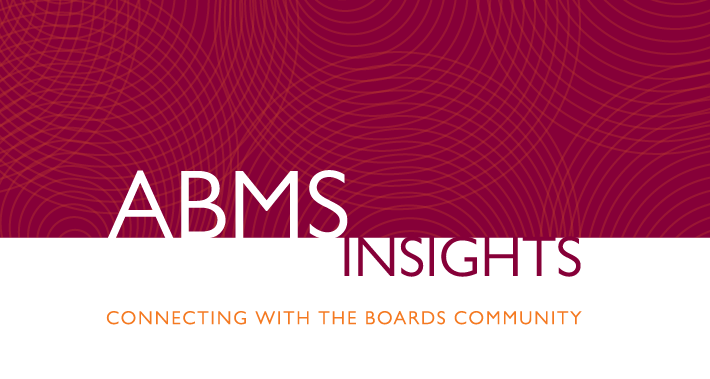
The American Board of Medical Specialties (ABMS) Member Boards are committed to supporting their board certified physicians, fellows, and residents as they work on the front lines to fight the novel coronavirus.

To that end, the boards have offered programmatic flexibility regarding examination scheduling as well as deferment of activities or requirements and/or the extension of cycle deadlines (depending on the timing of activities in the boards’ continuing certification programs in 2020). The following examples highlight how the boards have introduced flexibility into their certification programs and ensured physicians, fellows, and residents alike that they will not be adversely impacted by requirements during the Coronavirus Disease 2019 (COVID-19) pandemic. Some boards have even stated that physicians will not lose their certification if they are unable to complete a requirement this year.
Each board has posted easily accessible information about their COVID-19 response and continues to monitor the pandemic’s progression to make further adjustments as needed.
To address the concerns of residents and fellows that mandated quarantines or contracting COVID-19 could impact their eligibility to enter the examination system for certification, the American Board of Anesthesiology (ABA) informed all residents, fellows, and residency/fellowship programs that trainees will be awarded clinical credit if in institution-required quarantine as trainees could continue studying during quarantine to meet training requirements for exam eligibility. As the COVID-19 pandemic intensified and more fellows became engaged in providing care to patients, ABA gave fellowship programs the option to choose when/if to administer the 2020 In-Training Exam-Pain Medicine that was scheduled to occur in March. A similar option has been presented for the 2020 In-Training Exam-Critical Care Medicine. Regarding initial certification, ABA cancelled dates for the APPLIED examination through June. The board also waived exam change and cancellation fees for candidates affected by COVID-19 and has extended their duration of candidate status eligibility by one year. ABA then addressed current board certified anesthesiologists, announcing that it will waive continuing certification requirements for those who feel that they cannot meet the requirements in 2020 because of the COVID-19 pandemic.
The American Board of Emergency Medicine (ABEM) announced changes to its ConCert Exam, the most significant of which was to offer an online, open-book format with administration dates scheduled in July, August, and November. Board certified emergency physicians will be able to take the exam from home, using any resources they wish. There will be no proctoring, although exam takers will need to attest to an honor code statement when they first sign onto the testing session. Board certified emergency physicians will not incur additional costs for the move to the new format. In response to residents’ concerns, ABEM has taken actions to protect their eligibility for certification. For those residents who have to undergo a two-week period of quarantine, the yearly minimum of successfully completed training time will be reduced from 46 to 44 weeks for this academic year. ABEM also is supporting alternative means of resident education by sponsoring virtual learning opportunities.
The American Board of Family Medicine (ABFM) postponed its Family Medicine Certification examination and expanded dates for its Summer Sports Medicine Certificate of Added Qualification (CAQ) exam. ABFM also extended deadlines for board certified family physicians to complete continuing certification requirements; participate in the Family Medicine Certification Longitudinal Assessment, an alternative to ABFM’s one-day family medicine certification exam; take the one-day exam; complete the eligibility or re-entry process; and complete exam requirements for a CAQ. ABFM has established a method of delaying 2020 payments for those with financial hardship as a result of the pandemic.
The American Board of Internal Medicine (ABIM) extended registration and waived late fees for the Summer 2020 Internal Medicine Certification Exam with the option of taking it later in the 2020/21 academic year. Late fees also were waived for the Fall 2020 Subspecialty Certification Exams. ABIM extended the deadline to the end of 2021 to complete any Maintenance of Certification requirements due in 2020 – including points, attestations, and assessments. Physicians currently in their grace year also will be afforded an additional grace year in 2021.
After the American Board of Ophthalmology (ABO) postponed its oral examination in March, it surveyed the candidates about three options for taking the exam: rescheduling it for fall, postponing the exam until spring 2021, or attempting to convert the oral exam to a format that could be administered online. Nearly 80 percent of the 423 candidates who responded to the survey preferred having a virtual exam and almost 90 percent of them were willing to participate in a pilot project to make that happen. In June, candidates were invited to join the July 11-12 pilot examination as well as three additional online administration opportunities in August, September, and November. Understanding that future candidates may prefer the online format, ABO is studying potential structural changes to its initial certification examination framework.
In addition, Member Boards are taking an active part in addressing the needs of board certified physicians on the front lines fighting COVID-19. For example, ABA contributed 2,400 face masks and 4,000 nitrile gloves to Duke University and University of North Carolina Hospitals as well as 12 bottles of hand sanitizer to Durham Women’s Clinic. ABIM and the ABIM Foundation have each contributed funds to #GetUsPPE to facilitate the delivery of more than 50,000 pieces of personal protective equipment to front line physicians.
The changes and flexibility exhibited by the Member Boards illustrate a commitment to support trainees and physicians during these extraordinary times, allowing them to focus their time and energy on treating their patients and caring for their families.
© 2020, American Board of Medical Specialties
Read the Latest Issue of the ABMS Insights Newsletter
Subscribe to ABMS Insights Newsletter
-
Read More:
- ABMS Insights |
- COVID-19 |
- Member Boards |
